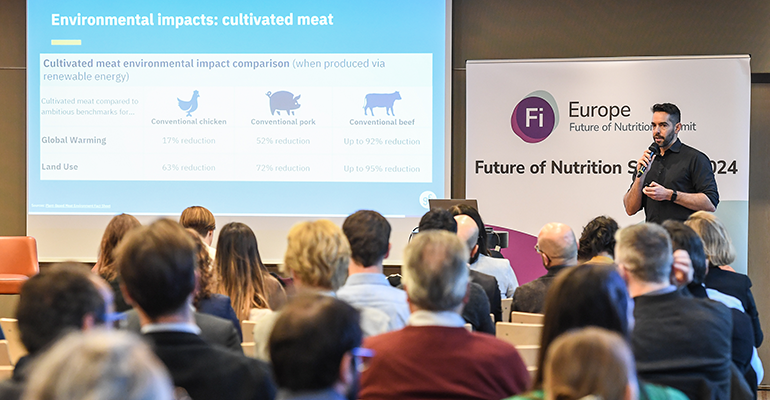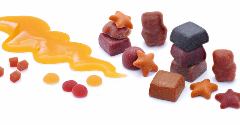News
Alt-protein dip not enough to distract consumers from meat replacement realties
12 Jan 2024
Despite a recent downturn in alt-protein’s fortunes, consumers haven’t lost faith in the idea of cultivated meats and plant-based food becoming a permanent fixture in diets of the future, according to Alex Mayers, managing director of the Good Food Institute (GFI) for Europe.
The observation comes after recent survey findings show the majority of European consumers believe meat alternatives with improved taste and lower price must be developed. These are key factors in convincing consumers to try plant-based meat.

“Consistently, the things that come out are taste and price at the top,” said Mayers, who was speaking at Food Ingredients Europe (FiE) in Frankfurt, in November.
“Those are the two things which are currently the barriers. We believe right now, that if taste were the same or better. If price were the same or lower for alternative proteins, they kind of become the default.”
Mayers, who was referencing a UBS Survey of over 3,000 US and European consumers in his presentation, added that the survey also identified nutrition as a close third, pointing out that consuming plants was better heath-wise than animal-based foods.
The shift by traditional meat firms to protein companies
While the presentation went on to discuss Unilever’s €1bn commitment to plant-based meat and dairy alternatives by 2027 and Nestle’s recent work with Future Meat Technologies, Mayers pointed to the repositioning of traditional meat firms into protein companies as “seeing the opportunity and where the future lies in their markets.”
This includes Tyson Foods’ recent launch of two plant-based brands Raised & Rooted and First Pride, coupled with the acquisition of BRF’s European operations in 2019. Its former CEO, Tom Hayes has said that, “If we can grow the meat without the animal, why wouldn't we?”
Fellow meat packing giant JBS has begun building the world’s largest cultivated beef protein plant in San Sebastián, Spain, which the firm believes will transform the company into global cultivated protein leader.
Myer’s presentation entitled: ‘Feeding the future: The alternative protein landscape,’ also discussed long-term investment growth, with GFI analysis of data from PitchBook Data, indicating that alternative protein investments totalled €2.66bn ($2.9 bn) in 2022, down 42% versus 2021.
“That decline tracked with the broader private investment environment,” said Mayers. “The drop in alternative proteins was only slightly larger than the 35% decrease in total global funding across all sectors in 2022.
“It was also smaller than the declines of some popular VC-funded sectors like fintech, which fell 46% year-over-year.”
Venture capitalist dip in meat alternative investments
Trends influencing these global investment declines included falling public equity markets, rising interest rates due to high inflation, ongoing impacts of the pandemic, and the invasion of Ukraine, which all contributed to reduced investment activity across sectors in 2022.
Added to the alt-proteins’ relative age, Mayers said that only a handful of large raises could heavily influence the topline investment numbers.
In 2022, for example, 3% of deals accounted for half of total investment dollars in alt proteins. So in a sector this size, one investment can have significant implications for year-to-year variations in investment totals.
“Over the longer-term, cumulative investments in alternative proteins in the last decade reached €12.8bn ($14bn). So, on average, alt protein investments nearly doubled every year over that span,” Mayers added.
In keeping an eye on the future, Mayers emphasised the role of traditional, biomass, and precision fermentation in alternative proteins, as processes that are likely to produce the protein at scale to meet expected demand.
While traditional fermentation is used to make sauerkraut, kimchi, and beer and is the most familiar to consumers, it is of little use in creating specific, high value functional ingredients.
 © iStock/JK1991
© iStock/JK1991
Here’s where precision fermentation comes in, which can be used to engineer things like enzymes, flavouring agents, proteins, vitamins, natural pigments, and fats.
Precision fermentation ‘powerful enabler’ of improved sensory and functional attributes
“The ingredients these ‘microbial cell factories.’ produce are typically high value ingredients, incorporated at lower levels, but are powerful enablers of improved sensory and functional attributes,” explained Mayers.
“For example, we are seeing a number of companies using precision fermentation to produce recombinant whey protein that can be incorporated into plant based dairy formulations.
“Precision fermentation can also be used to create things like growth factors that are used in cultivated meat production.”
Mayers went on to discuss biomass fermentation, which uses the microorganism itself as a source of food, here by leveraging the fast growth and high protein content of a microorganism to efficiently produce large quantities of protein.
He said that the technique, which is used to make mycoprotein-based Quorn, offered the greatest opportunity to produce protein at scale because many microorganisms can grow very quickly and efficiently, often doubling their weight in just a few hours.
Related news

Bone broth: From old-fashioned to en vogue
24 Nov 2025
OXO’s entry into bone broth has turned the spotlight on this small but high-performance category – and there is still scope for growth, especially in the area of GLP-1 support.
Read more
Matcha madness: Why green is this year’s hottest colour
19 Nov 2025
Five years ago, it was a struggle to find matcha outside of Japan. Now it seems to be popping up everywhere, from coffee shops to supermarket shelves.
Read more
How younger consumers are redefining ingredient choices and rejecting brand loyalty
18 Nov 2025
Gen Z and millennial consumers’ preferences for transparency, functionality, and purpose are “redefining the very nature of consumption itself”, says SPINS.
Read more
Hybrid formats and flexible positioning to disrupt category norms in 2026
17 Nov 2025
Trend forecasters expect food and drink to move more fluidly across occasions, functions, and formats as consumers seek versatility, novelty, and convenience.
Read more
Empowering innovation in fortification and colouration
13 Nov 2025
Divi’s Nutraceuticals offers a large portfolio of innovative, high-quality ingredients for foods, beverages, and supplements, with bespoke solutions and expert support for product success.
Read more
Predictive maintenance redefines powder mixing reliability
13 Nov 2025
Mill Powder Tech's smart control systems harness real-time data to help the food and biotech sectors achieve zero downtime and smarter output, alongside rigorous GMP standards and ambitious ESG goals.
Read more
From fruit to functional solutions: Meet Paradise Fruits at Fi Europe in Paris
13 Nov 2025
Paradise Fruits Solutions and Paradise Fruits Health will showcase their combined expertise in delivering innovative, fruit-based solutions to the food and beverage industry at the upcoming Fi Europe trade show (2-4 December 2025, Paris).
Read more
Danone highlights digestive health as potential ‘tipping point’ for food industry
13 Nov 2025
Danone is betting on a food industry “tipping point” that will bloat the market for healthy products, particularly those related to gut health.
Read more
Bord Bia presents Irish dairy ingredient suppliers at Fi Europe
6 Nov 2025
Dairygold Co-operative Society, The Carbery Group, and Ornua Co-operative: Meet with sustainable producers of Irish dairy ingredients at Food ingredients Europe 2025, Hall 7.2 Stand M18.
Read more
Ingredient quantities mislabelled on popular protein bars, independent tests show
5 Nov 2025
Some popular protein bars contain more fat, carbs, and/or sugars than claimed on their labels, independent nutrition testing reveals.
Read more